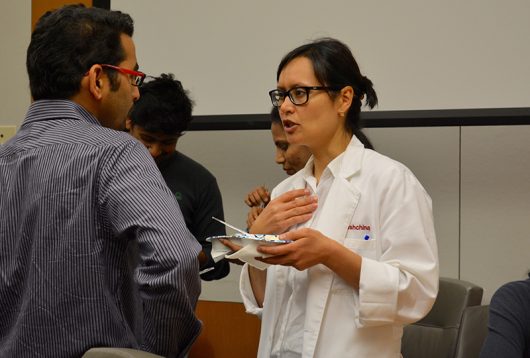
At an ice cream social on Sept. 20, postdoctoral scholars celebrated National Postdoctoral Appreciation Week. Brenda Reader, organizer of the event, called it “a chance for postdocs from many different programs on campus to interact, share ideas and just relax.” Credit: Deepti Hossain | Lantern Reporter
“Have you been appreciated this week?” someone asked a room full of postdoctoral scholars eating vanilla ice cream topped with chocolate syrup and sprinkles.
Ohio State postdoctoral scholars celebrated National Postdoc Appreciation Week with an ice cream social Wednesday afternoon in the Biomedical Research Tower.
“Never underestimate the positive power that free food, whether it be pizza or ice cream, can have on morale,” said Brenda Reader, co-chair of the Ohio State Postdoctoral Association, the organization hosting the social.
Postdoctoral scholars, or postdocs, are people who have completed their doctoral degree and follow it with a temporary, advanced training.
NPAW is an opportunity to highlight a population that does not fit into students, faculty or staff.
“We want to show postdocs that they are valued and deserve an incentive every now and then,” Reader said about the ice cream social.
The event promotes networking and social support among postdoctoral scholars at OSU, Reader said.
“It gives a chance for postdocs from many different programs on campus to interact, share ideas, and just relax,” said Reader.
Postdoctoral scholars are an essential part of research, as they spend time in the lab and help professors complete experiments and papers.
“Postdoctoral researchers are a major part of the research workforce, particularly academic institutions such as universities and research institutes. They are the ones that really push a lot of research forward,” said Marcela Hernandez, the graduate and STEM diversity director for College of Arts and Sciences.
The Ohio State Postdoctoral Association awarded Hernandez the 2016 Postdoctoral Advocate of the Year.
Although postdoctoral positions were originally meant to be short term — two to three years — this is no longer the case, Reader said.
“Years ago, grad school usually took four years to finish and postdocs used to be a very transient position with maybe a two-year stint associated with it,” said Reader, who is also a postdoctoral fellow for the OSU Wexner Medical Center. “Now, there has been a change in the system where it takes the average grad student in biomedical science as long as six and a half years to get their doctorate, and then postdoc can last another five years, and maybe longer if you switch.”
By the time people are postdoctoral scholars, they are in their 30s and might be having children, Hernandez said. However, OSU — and many other institutions — does not offer parental leave. Postdoctoral scholars work long hours and are highly educated, yet their average income ranges from $35,000 to $50,000.
The OSU PDA and the President and Provost’s Council on Women are actively working together to address these problems, which are being celebrated during NPAW.
“This council gave invaluable advice and mentorship and enthusiastically supported our suggestions for the addition of paid parental leave for postdocs,” Reader said. “Over the last several months, (Provost Bruce McPheron) has … presented our proposals to Council of Deans meetings. He was able to update us that the deans were uniformly supportive of our proposals.”
Additionally, OSU does not have an office of postdoctoral affairs, but instead a virtual office and a postdoctoral advisory council.
Some people, like Bo Zhang, a postdoctoral researcher for the department of chemistry and biochemistry, want a permanent office.
“We need a voice that can … give you what we are, what we do and what we can contribute to the community,” Zhang said. “That can keep track of all the postdocs, how they develop, how they get involved, how they get used to their lives here, and what kind of jobs they can get afterwards.”
Hernandez said she is hopeful for a permanent office for postdoctoral researchers in the near future, citing support from administrators in the Office of Academic Affairs and the Office of Research.
“I’m hopeful that maybe by next fall we’ll have a postdoctoral affairs office for the university. That would really give a lot of support to this community,” Hernandez said. “They need help with career development, and the international postdocs also need help with transitioning and adapting.”
Although celebrating NPAW highlights postdoctoral scholars, there are still improvements to be made, Zhang said.
“In general, it’s a very nice idea. It’s something that brings people’s attention (to postdocs),” Zhang said. However, “one week out of a year is not sufficient, I hope we can have more.”


